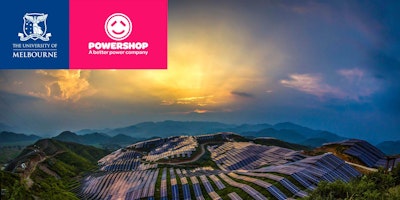Energy Hack 2017
The global energy sector is going through a rapid transition. The way energy is produced, stored and used is changing. New technologies such as solar and batteries promise to turn the traditional, centralised power grid on its head. But will the system be as distributed as current trends suggest? What is needed for a faster, more productive, cheaper and cleaner energy system?
As power prices in Australia continue to soar upwards and the threat of a repeat of state-wide blackouts loom – finding the key to unlocking reliable, 24-7, high quality, cheap, climate friendly energy at scale is becoming more and more urgent. The race is on and the question on everyone’s lips is: what will it take for Australia, with its abundant renewable resources, to lead the global marketplace in this space?
What
Energy Hack 17 is hosted by the Melbourne Energy Institute, with founding partner Powershop. It’s the second year we have brought together a community of hackers, hustlers and hipsters – determined to harness the consumer and technology revolution in energy. With the help and support of this year’s event partners: Victorian State Government, City of Melbourne, AEMO, Citipower/Powercor, Deloitte, Allens, DB Results, ZEN Energy, Clean Energy Council, and Intelligent Energy Systems (IES) we are excited to bring you an even bigger and better event.
Join us for two dynamic days to discover and engineer opportunities in the brave new world of connected, low carbon energy. Get access to data, experiment with new forecasting and machine learning methods, explore commercial applications of block chain technology, test your ideas with business mentors, collaborate with the Powershop and Melbourne Energy Institute team, learn about the aspirations that motivate consumers, discover emerging technologies, tap into Melbourne’s entrepreneurial fire power and shake up your thinking.
This two-day hackathon will bring experts in industry and policy together with researchers and students from diverse disciplines. Unlock ideas, educate influencers and stimulate entrepreneurship in the energy industry.
Sign up to our newsletter for updates
Pre-requisites
Anyone with a passion for learning and solving problems is welcome.
Energy Hack format
1. Two-day energy hack in Melbourne.
2. Collaborate with other innovators, researchers, entrepreneurs and end users.
3. Build and test your ideas.
4. Pitch to the panel.
What to bring
Please bring your own laptop and any tech you wish to use and of course, your creative mind, ideas and passion to shake things up!
Prizes
There are some excellent prizes up for grabs, including $5,000 cash, Powershop power credits and a cosy dinner with leaders in the energy and start-up community, just to name a few.
Panel of Judges
Michelle Groves - CEO, Australian Energy Regulator
Jo Witters - Executive General Manager, Office of Innovation, Australian Energy Market Operator
Simon Holmes à Court - Energy Entrepreneur
Melissa O'Neill - General Manager Corporate Affairs, Citipower/Powercor
Michael Brear - Director, Melbourne Energy Institute
Sabiene Heindl - Director, Strategic Engagement & Corporate Counsel, Energy Consumers Australia
Michael Benveniste - Head of Commercial & Strategy, Powershop
Participation costs
$25 entry fee includes lunch on both days and snacks to see you through.
Please note spaces are limited, so hustle hackers.
Times
Friday: 6:30pm-10:00pm - Launch & team formation
Saturday: 10:00am-10:00pm - Full day hacking
Sunday: 10a:00am-7:00pm - Half day hacking & pitching to judging panel
Themes
Community Power
There have been some great examples in Australia of community owned and run energy production. Wind turbines and large solar arrays have been purchased by community groups and boards of directors set up to run these mini power plants. But do Australian towns really want to purchase their own energy production infrastructure? Does a suburb want to run its own zero-carbon power plant? Should a community set up its own micro-grid? Communities are becoming increasingly keen to take control of their own energy production. With distributed storage and production technologies becoming more and more accessible, community spaces such as school and town hall roofs are being utilised to produce energy. Whether a battery bank, a solar array or a modest wind farm, unused spaces are being revitalised and income generated from community power production is being invested back into schools and other services vital to the community.
The Virtual Power Plant
Can you imagine if grid infrastructure was provided as a trading platform, allowing you to buy solar energy from your neighbour? Energy has never been deemed sexy, but neither was car transport, and look how the Uber business model has taken the world by storm. What if energy was traded via peer-to-peer interactions utilising a Blockchain system? Consider the growing Internet of Things connecting things-to-things and people-to-things and people-to-people. What could a virtual grid look like and what sort of social and hardware interactions would eventuate?
What happens if we compensate people who invest in batteries of distributed generation on their side of the meter, and we create a two-way system – a more productive system, meaning we don’t have to invest in generation that is only going to be used a few hours a year – because you can use the load itself as a balancing resource?
